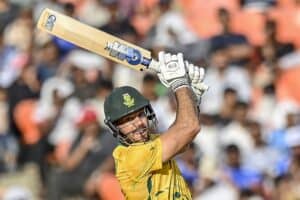South Africa have been much-improved in all departments and hold the edge going into the final day of the series.

The Proteas look to be on the verge of a famous series leveling win against the Black Caps, after play closed on Monday’s fourth day at Hagley Oval with the hosts needing an improbable 332 runs to win on the final day with six wickets in hand.
So most South Africans should wake up on Tuesday morning to a resounding Proteas win, which is a complete reversal from their dismal first Test showing at the same ground a week before. Rain may be the only factor in the way of South Africa picking up the victory.
Here are three key points in the Proteas’ reversal of form that should see them keep intact their famous record of having never lost a Test series against New Zealand.
Top and middle order finally come good
The Proteas’ top and middle order has been much maligned in recent times and have struggled to post scores in excess of 300, usually settling for scores in the low 200s or 250s at best. That all came to a head in the first Test where they were brutally exposed and knocked over for a combined 206 in both innings after crashing to 95 all out in the first and 111 all out in the second.
A hugely improved effort was needed in the second Test and so it proved with the Proteas scoring in excess of 350 in both innings.
Sarel Erwee was the star of the first innings, scoring a maiden Test hundred in just his second match, while top and middle order contributions from Aiden Markram, 42, Dean Elgar, 41, Rassie van der Dussen, 35, and Temba Bavuma, 29, all helped keep the scoreboard ticking.
The top order then failed in the second innings, leading to the middle order stepping up as Kyle Verreynne scored a maiden unbeaten Test century, while Van Der Dussen, 45, Wiaan Mulder, 35, and Bavuma, 23, all chipped in around him.
The tail wags
The Proteas’ tail has often played a vital role in picking up valuable lower order runs in recent times after the failings of the top and middle order, however in this match they were able to come into bat with the team in a much better position than they usually are.
Despite that they still played their part in picking up some much needed extra runs, with Marco Jansen, 37no, and Keshav Maharaj, 36, combining for an impressive 62-run ninth wicket stand in the first innings.
In the second innings, Verreynne guided the lower order, but Jansen still played a role backing him up with nine off 41 balls.
Kagiso Rabada then absolutely flayed the New Zealand bowling attack in smashing 47 off 34 balls (4×4; 4×6) in a 78-run eighth wicket stand, while last man Lutho Sipamla, 10no, helped Verreynne get them over the 350-run mark as they shared an unbeaten 32-run last wicket stand.
Rabada continues fine form, spin does the trick
On the bowling front, the Proteas have been on point, although they will most likely admit that they were frustrated in allowing the Black Caps to escape from 91/5 to scoring 293 all out in their first innings.
However, the Proteas’ bowling ha been much-improved from the first Test. Key to that has been the form of strike bowler Kagiso Rabada, who is looking back to his best and has continued his good form from the Indian series.
He struggled in the first Test with figures of 2/113 in the hosts’ only innings, but in the second he has claimed 5/60 in the first innings, backed up by Marco Jansen’s 4/98, while he’s picked up 2/17 in the second so far, backed up by Keshav Maharaj’s 2/32.
Also playing a big part in the Proteas’ performance has been their decision to add spin back into the equation after Maharaj missed the first Test.
New Zealand have struggled with their all out pace attack and although spin wasn’t expected to play a part, Maharaj has been the perfect foil for the Proteas quicks, with a solid contribution of 1/46 off 16 overs in the first innings, followed up by his second innings effort.
Support Local Journalism
Add The Citizen as a Preferred Source on Google and follow us on Google News to see more of our trusted reporting in Google News and Top Stories.






